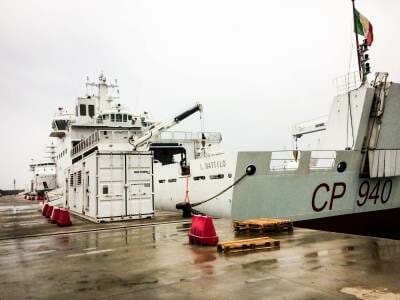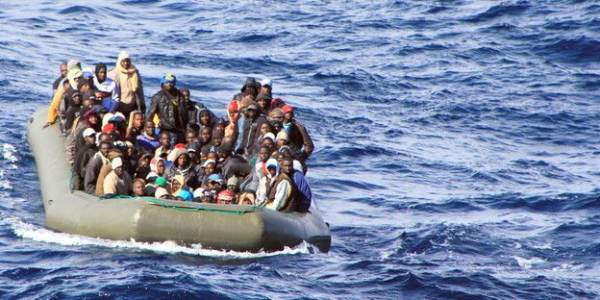After landing: Staying in Italy between time-consuming beurocracy transfers
By now we read daily news about the landing of immigrants
on the Sicilian shores and elsewhere. These episodes must be accurately
monitored and analysed. Above all they must be considered as an example
of what happened before and what happens after the media spotlight turns
off. Following immigrants pathways once they land is not easy, even
those who apply for international protection and are therefore included
in the reception and protection system.
The ongoing state of emergency engenders instability in immigrants
placement and is characterized by frequent transfers. These transfers
are decided depending on necessities other than speeding up the
immigrant’s asylum request process or the integration in our country.
Despite their continuous transfers, immigrants are sometime able to
establish relationships with the locals: they leave phone numbers; they
build small but resistant networks depending on their luck and
possibilities.
Following one of these frail traces, I decide to visit two centres of
first and second reception, located in Vittoria, a small town in the
Ragusa district. Several North African and Eastern European citizens
have lived here for several years, working in the greenhouses of the interland. I first visit the coop. SPRAR centre for minors “Nostra
Signora di Gulfi”, which manages two communities for unaccompanied
minors in Chiaramonte Gulfi and one SPRAR centre for adults asylum
seekers. I am received by the responsible of the centre, Noemi, who
shows me around. The centre consists of a house on two floors, located
in the city centre. According to Noemi, since April 2014 the centre is
active as a SPRAR hosting 8 boys between 12 and 17 years old. They come
from Gambia, Senegal, Guinea Bissau, Ghana and Egypt. Most of them
arrived during the last sorting round in June. When I meet some of the
guests the focus is precisely on the transfers issue. Since they are
minors, those previously located in other districts had to change their
legal tutor once in Vittoria. Therefore, two out of the eight boys have
been waiting for three months for a judge’s decision. They are forced to
watch while their international protection request freezes. Indeed the
process cannot go on to the following step, namely the interview with
the Commission, until they are not assigned to a tutor. Additionally, it
is difficult for the only welfare worker in town to regularly assist
all the boys given their large numbers. The boys attend daily literacy
classes at home and in a few weeks they will start attending evening
classes at the adult professional training centre. “We are activating
job scholarships and we work to increase their responsibility also by
managing the centre. With the operators’ help, the boys clean common
spaces and importantly they cook their own meals”, says Noemi. While we
speak, M. is cooking rice and listening to reggae music while the others
dry clothes or communicate with friends and families through internet.
“Sometimes they are so embittered by bureaucracy slowness that they
threaten a “white strike”, that is no more study. “Who can blame them?”,
concludes Noemi, providing another cross section of a system in a state
of constant emergency that can be no longer be excused.
I definitively find a more lively environment in the afternoon, when I
visit the two first reception centres of the social cooperative Area,
located a few meters away from the monumental council villa. The
president Matilde Farina introduces me to operators and guests, around
twenty migrants, housed in two different apartments. The cooperative
started this service in November 2013, training the operators who
previously took care of elders, disabled persons and persons with
psychic disorders. The co-op now can count also on the collaboration
with a cultural mediator and literacy teachers.
In the first apartment I meet B., who comes from Gambia. He speaks
slowly but follows our conversation. “My problem is not to understand,
but to speak Italian! I first arrived in Pozzallo in June, then from
there I was transferred here, but I still don’t have documents. I am
trying to learn Italian, but what else can I do without documents?”.
Some of his friends received the Commission denial and now have a permit
as claimants, but they need an extension in order to stay in this
centre. In the meanwhile new migrants arrive, and the operators add
extemporary beds because they don’t have the heart to leave them on the
street. “In this area it’s easy to fall in the racket of exploitation
and of task-work, which is paid few euros per day”, tells me Matilde. In
a room at the last floor of the house I meet three young men from
Bangladesh who speak poor English and just smile. They share the room
with a young man from Mali, with whom they established a peaceful
cohabitation. No matter what, within a few days they would be
transferred to another first reception centre.
After a little while, I meet the guests of the second apartment who are
all from Bangladesh. After arriving in Pozzallo the 5th of August, in
the famous landing of the 957 migrants -since now the biggest ever
recorded in the small harbor- they were transferred from Comiso to
Vittoria just last Friday. As soon as they see us coming they all gather
in the living room, with some difficulty to find a seat. They are 14,
four more than the supposed number of guests of the centre. Even in
this case the overcrowding has to be ascribed to the emergency state
combined with bureaucracy slowness in planning future transfers. It is
even difficult to walk to the bedrooms, “Too small, this place is too
small for all these people”, says Z. Only three of them speak English,
and they translate for all the others, helped also by a Bengali
interpreter who was called by the cooperative on Saturday to inform the
migrants about their situation. “In Comiso we were a lot. 500/550
people”, A tells me “We came all on the same boat from Libya, but we are
from different areas of Bangladesh. I stayed in Libya around two
months, right now staying longer is too dangerous”. M. browses a
Bengali/English dictionary and writes down a few lines on a notebook:
“We would like other books to learn English and Italian”, another three
young men sitting on a sofa ask. They had their first Italian class with
an operator from the centre just the other day. Since they arrived,
their time revolves around meals. “Next time we will speak Italian, I
don’t care about English, now I am in Italy”, A. whispers to me, while
saying goodbye and confirming that immigrants, who are forced to pay the
price of the constant emergency, are also those who, relying on their
own determination, shows us how to overcome it.
Lucia Borghi
Borderline Sicilia Onlus
Translated by Alessandra Mancini and Daniele Cesaretti


